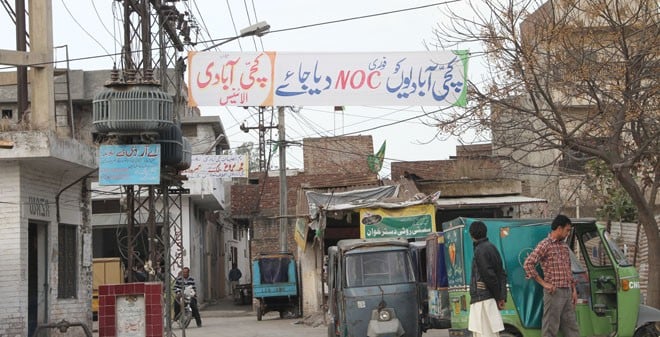

Beside a 400 years old Darbar of Dars Barre Mian on Shalimar Link Road, is located the most populous katchi abadi (KA) of Lahore with 3,500 houses and about a population of 2 million on 550 kanal of land.
From one end of the abadi to the other, all the streets and lanes are paved, contrary to what one may imagine a katchi abadi to be.
Most of the houses are buildings of two to three storeys on 2-3 marlas of land. There are also houses on one marla.
People living there face a host of issues. "The moment people try to make some changes to the building of their houses -- like installing a new door, window, etc, the Railway authorities object to that. One has to pay them money, there is no recourse," says an office-bearer of the Alliance for Katchi Abadis, who lives there.
"Railway officials stop us from doing work at home for small businesses. Many women in this area are home-based workers," he says.
The people settled in Dars Barrae Mian Katchi Abadi came to Lahore from India in 1947. By now, 380 kanals of land has been transferred to the people. There is water, electricity, and gas. There are two boys and a girls’ school in the area. Efforts are on to establish a college as well. What is absent is a security mechanism. Hence, crime rate is increasing.
Those who missed the opportunity to get the land transferred in their name when the rules were lax find it impossible to do so now that the government has raised the price of land. Now, the market rate is Rs.250,000 per marla.
According to Directorate of Katchi Abadis in Lahore, for 15 years, till June 30, 2013, land in KAs was only for Rs.172 per marla. "Those who did not take the initiative to get land registered in time are now complaining. Now market rates apply."
"The government has notified that anyone who wants to get ownership rights will have to pay the market price per marla. That means to get two marlas of land registered in one’s name one needs five lakh rupees," says Hammad Malik, President All Pakistan Alliance for Katchi Abadis. "In other words, they have put a check on giving more ownership rights," he adds.
People suspect that the Federal Minister for Railways, Khawaja Saad Rafique, wants this area to settle people of his choice. Government’s policies have changed with time. In 2012, the then chief minister, Shahbaz Sharif, had declared that a settlement with as few as 10 houses (and not 40) will get the status of a katchi abadi. Perhaps, it was because 2013 was the election year.
Some of the people living here work in the Railway workshop, some work in the vegetable market, and some sell used clothes in landa bazaar. "The youth that has no work, is into gambling," says a middle-aged man in the area.
A social worker in the katchi abadi, Anwar Khan Tanoli, says nobody is serious about the poor, neither media, nor government. "The government is giving free books but how can the children study on empty stomachs?"
Hammad dreams about having representatives of labourers, masons, and katchi abadis in national and provincial assemblies and senate.
"People have not come into power from katchi abadis since 1977," points out Dr. Imdad Hussain, Assistant Professor at FC College and member executive body, Punjab Urban Resource Centre. "Pakistan is among the first few countries to regularise katchi abadis," he says.
He believes money should be put to better use, like solving sewerage problems, which would solve half of the health problems. "In its absence, there are immense health issues," he says.
In Dars Barrae Mian Katchi Abadi, all the roads were laid in 2006. The schools here, too, were established in that year.